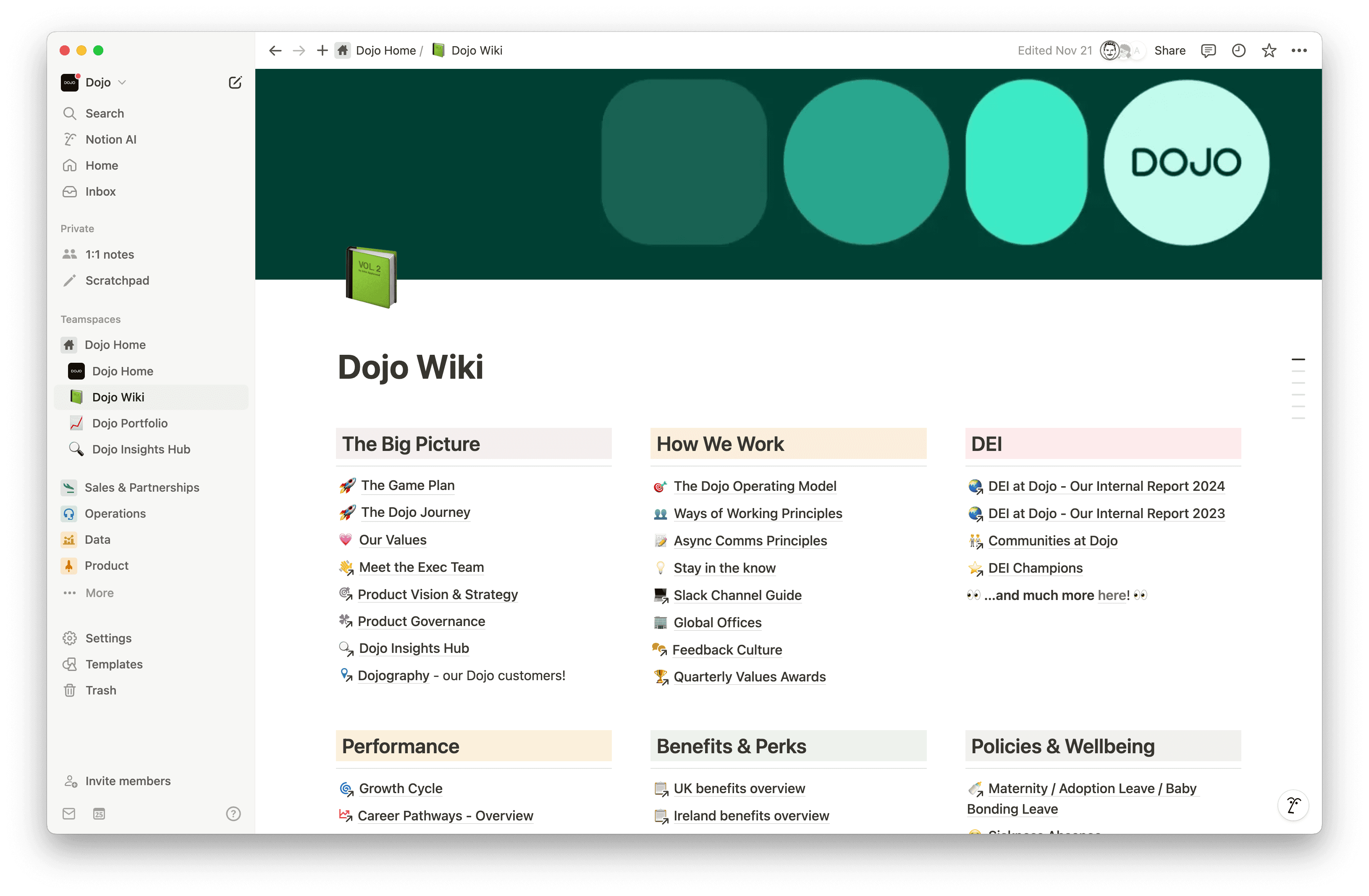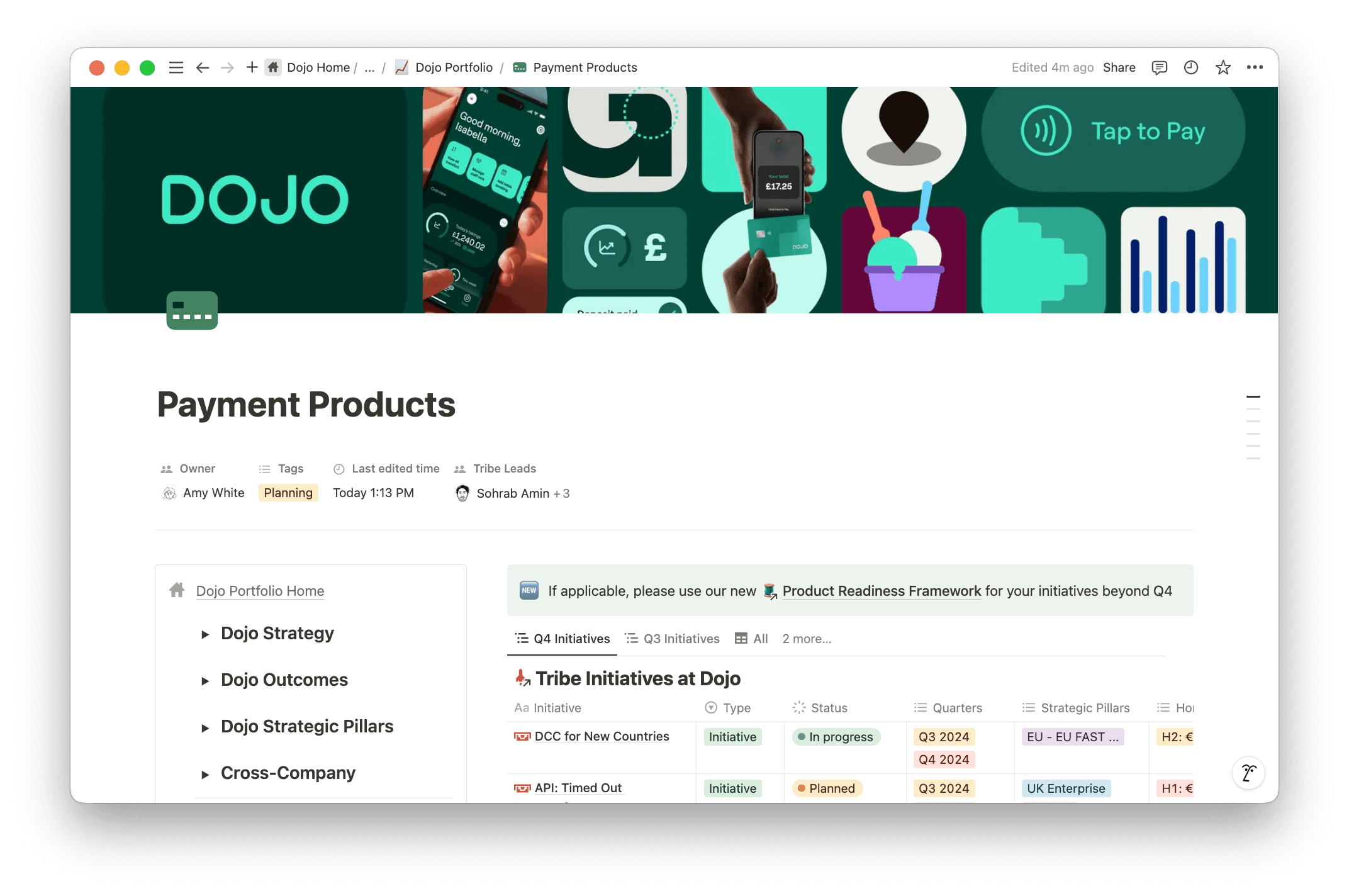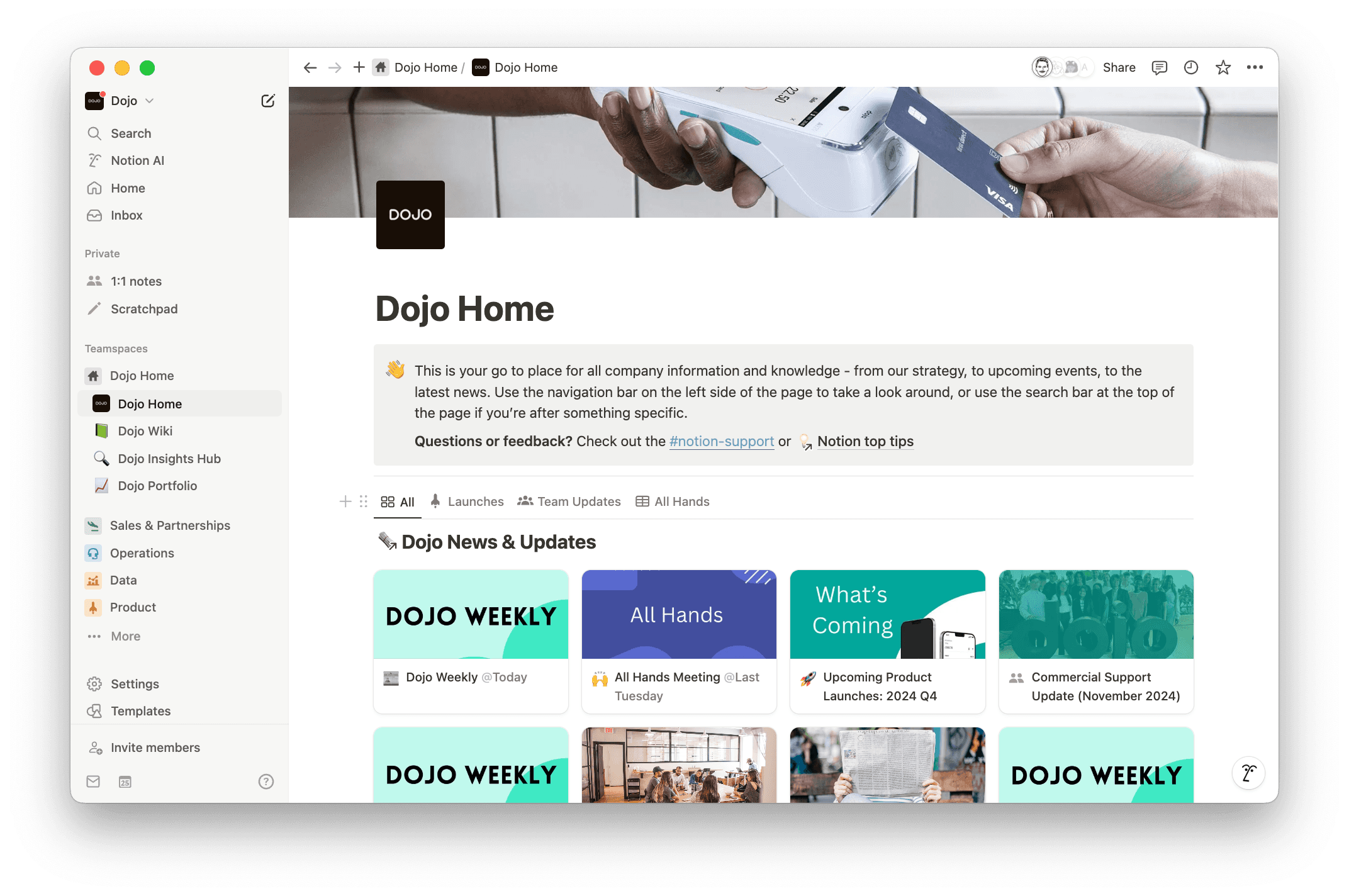
How Dojo consolidated dozens of tools with Notion for a faster way of working
As Dojo grew from startup to scaleup, their disconnected SaaS instances and redundant tools created siloes that stalled work and frustrated everyone. By transitioning over 1,000 employees onto Notion within just a few months, they unlocked both massive cost savings and productivity gains. Now everyone gets hours back every week with more efficient workflows and a more collaborative way of working together at scale.
Uh-oh! It looks like your ad blocker is preventing the video from playing.
Please watch it on YouTube
Too many tools, too many meetings
Walk into just about any local business in the UK or Ireland, and you're likely to spot a sleek card reader bearing the Dojo logo. From digital payments and integrated services to virtual bookings, Dojo helps these businesses accept payments faster and serve more customers. The team has rapidly expanded from a few hundred to a workforce of well over a thousand employees across multiple locations, and is now one of the fastest-growing payments companies in Europe.
As the company grew, though, teams preferred sticking with the same apps they had been using. Dojo's tool stack quickly ballooned to hundreds of different software instances and tools for everyday work. Some teams used various Trello boards, while others relied on different Smartsheet instances or niche tools for single use cases like building product roadmaps. Project files and notes were scattered across various drives—technical documentation lived in Confluence, while other organisational knowledge was siloed in a separate wiki tool collecting dust.
Their app library had become an impenetrable maze of scattered systems, with different apps and logins at every turn. This was leading to more meetings and back-and-forth in Slack channels to bridge the gap these silos had created. “Although it’s amazing to have so much autonomy and white space to use whatever tool works for you, it wasn’t efficient financially or logistically,” explains Katie Warwick, Head of People Experience at Dojo.
For Dojo’s Chief Product and Technology Officer Nick Fryer, it reached a tipping point. So he set out to diagnose the root cause of their tool sprawl and quickly found the answer: the lack of a central source of truth that could adapt to every team’s needs.


When we were a smaller company, we heavily relied on meetings to coordinate different workflows. As we grew across multiple offices, we needed to find a more practical way of collaborating and facilitating asynchronous work. That's where Notion came in.

Head of People Experience
Tap into organic Notion adoption to champion the change
As they started the search for an all-in-one option, Notion kept popping up in conversation. Tons of employees were already enthusiastic power users—some used it in their personal lives, others at work. Small teams within the Product and Marketing departments were already using it to manage day-to-day work projects.
When Dojo acquired WalkUp, they gained more than just a team—they inherited a Notion playbook. WalkUp's engineering teams had already built robust technical documentation in Notion, a setup that quickly convinced Dojo's existing engineering teams they could move out of Confluence and do the same.
Once they decided to bring Notion on board, Dojo leveraged these existing Notion users to drive adoption, recruiting ambassadors from each department to champion the transition. These 100 ambassadors were instrumental in Dojo's Notion workspace development through their participation in enablement sessions, establishment of documentation practices, and creation of templates and content. "Involving, supporting, and training a network of ambassadors was absolutely critical to a successful migration," Katie said.

A phased approach starting with essential information
Dojo started their transition to Notion by replacing Simpplr, their static company intranet tool, with a dynamic Notion wiki that was easier to maintain and search. This foundation helped establish Notion as the go-to source for all company knowledge, from HR policies to company news and technical documentation. They then put Notion's databases to work and created a comprehensive system for planning and OKRs, connecting company-wide goals to specific team initiatives. This structured approach helped teams track progress more effectively, align their work with broader company objectives, and maintain visibility across all planning activities.
The Product team, who had initially been using Dragonboat (a standalone roadmapping tool), discovered that Notion's databases offered greater flexibility through customisable properties and additional views for different stakeholders. Moving their product roadmaps to Notion to live alongside company objectives and strategic planning documents gave them improved visibility into work and fostered stronger cross-functional collaboration as all Dojo employees were familiar with and had access to the platform.
By first establishing Notion as the trusted destination for essential company knowledge and information, Dojo set the stage for it to naturally evolve into a central workspace where all teams could collaborate and manage their workflows together.



Notion is the linchpin of our planning processes and collaboration. Because everything is visible company-wide, everyone can see what all teams are focusing on to understand the dependencies between workstreams and how their work is connected.

Head of Delivery
Centralised workflows to establish a new, transparent way of working
Dojo also replaced all their scattered project management tools (like Trello and Smartsheet) to centralise everyone’s work in the same space. Using Notion's flexible databases, teams now conduct all their planning and product roadmapping where they track everyone’s projects—complete with customisable views like Kanban boards and timelines. They can easily connect these projects to relevant documentation and other workstreams that ladder up to company-wide objectives.
This new system has become the backbone of Dojo’s work. Instead of extra meetings or back-and-forths on Slack, teams can now work and collaborate all in Notion. The result is a new level of transparency where everyone can understand the work that’s happening and how they’re driving company objectives forward.



When we rolled out Notion company-wide, it wasn’t just a tool change—it was the launch of a new way of working together.

CPTO
Maintain good workspace hygiene with new rituals
To maintain the effectiveness of their Notion workspace as they scale, Dojo has established key rituals that keep information fresh and engagement high. The company publishes weekly newsletters in Notion, ensuring everyone stays informed about company progress without creating extra noise in tools like Slack or email. Teams also maintain dedicated spaces for sharing wins, learnings, and updates, creating a dynamic, living workspace that reflects the company's ongoing evolution.


Keeping their SaaS sprawl in check saves Dojo time and money for a substantial ROI
The value of consolidating tools into Notion has been significant: Dojo has gained better control over their tool stack costs while employees spend less time or searching through Slack messages and emails. Instead, they reclaim hours each week for more strategic work.
These time and cost savings translate into a substantial return on Dojo's investment in their Notion Enterprise plan. That ROI continues to grow as teams streamline more workflows in their workspace, with over 80% of employees now actively engaging every week.
But beyond the bottom line benefits, the true impact of their Notion workspace for Dojo is how they will be able to continue evolving their ways of working. By providing a foundation for transparent, collaborative work, Notion helps their teams stay connected and agile as they scale.










